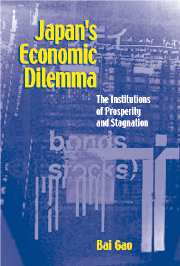Book contents
- Frontmatter
- Contents
- Acknowledgments
- 1 Introduction
- 2 Three Theoretical Issues
- 3 The Rise of the Principles of Coordination and Stability
- 4 Coordination, Excessive Competition, and High-Speed Economic Growth
- 5 Stability, Total Employment, and the Welfare Society
- 6 The Roads to the Bubble
- 7 The Struggle of the Welfare Society
- 8 Fighting the Stagnation
- References
- Index
1 - Introduction
Published online by Cambridge University Press: 07 January 2010
- Frontmatter
- Contents
- Acknowledgments
- 1 Introduction
- 2 Three Theoretical Issues
- 3 The Rise of the Principles of Coordination and Stability
- 4 Coordination, Excessive Competition, and High-Speed Economic Growth
- 5 Stability, Total Employment, and the Welfare Society
- 6 The Roads to the Bubble
- 7 The Struggle of the Welfare Society
- 8 Fighting the Stagnation
- References
- Index
Summary
After demonstrating seemingly unsurpassable competitiveness for several decades, the Japanese economy experienced a major reversion from prosperity to stagnation in the 1990s. Observers confront a daunting question: How do we explain this reversion?
Some comparative statistics will illustrate the extent of the crisis. In the period following World War II, Japanese economic growth was astounding, occurring at an average annual rate of 9.3 percent in 1956–1973 and 4.1 percent in 1975–1991. From 1946 to 1976, the Japanese economy increased 55-fold (Johnson 1982, 6). Between 1955 and 1973, Japan quadrupled its gross domestic product (GDP) per worker from $3,500 to $13,500. This sustained record of growth is reflected in the conclusion drawn by Richard Katz (1998, 55): “No other major country, before or since, has managed this all-important development task in such a short time.”
In the last decade of the twentieth century, however, the bubble of the Japanese economy burst. The depth of the crisis was as astonishing as the extent of the preceding success. In the 1990s, the Japanese economy grew at a mere 1 percent per year on average. In 1997 and 1998, it even experienced negative growth. According to one estimate, Japan lost 800 trillion yen in the stock and real estate markets between 1989 and 1992; this loss was equivalent to 11.3 percent of the country's national wealth. Both markets continued to slump after 1992, sinking to (or below) levels perhaps comparable to those in World War II, during which Japan lost 14 percent of its national wealth (Kikkawa 1998, 6–7).
- Type
- Chapter
- Information
- Japan's Economic DilemmaThe Institutional Origins of Prosperity and Stagnation, pp. 1 - 21Publisher: Cambridge University PressPrint publication year: 2001



